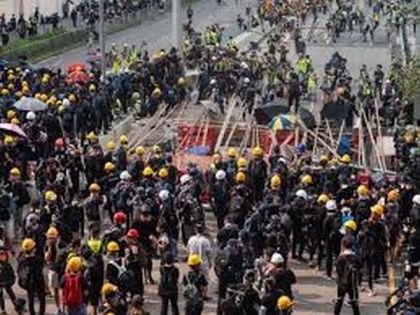To impose dominance over Hong Kong, China legislation bans 'collusion' with world
By ANI | Published: June 20, 2020 01:28 PM2020-06-20T13:28:44+5:302020-06-20T13:45:07+5:30
As the pro-democracy and anti-national security law protests in Hong Kong continue to draw attention to the atrocities being committed by China, the Beijing government seems to have become more adamant in isolating Hong Kong and imposing its dominance in the city.

To impose dominance over Hong Kong, China legislation bans 'collusion' with world
As the pro-democracy and anti-national security law protests in Hong Kong continue to draw attention to the atrocities being committed by China, the Beijing government seems to have become more adamant in isolating Hong Kong and imposing its dominance in the city.
In the bid to muzzle the growing dissent voices, the Chinese government has included the word "collusion" in the national security law. With this move, the legislation has now criminalised "activities of foreign and external forces to interfere in the affairs" of Hong Kong and anyone who "colludes with foreign states in plotting to harm the motherland's sovereignty, territorial integrity and security" will be sentenced between 10 years and life in jail, the South China Morning Post reported.
According to the Xinhua News Agency, the draft law discussed by the National People's Congress Standing Committee (NPCSC) has clearly outlined the crimes of secession, subversion of state power, terrorist activities and collusion with foreign and external forces to endanger national security, as well as lays out their penalties.
This new weapon to silence the Hong Kong protesters, has given rise to fresh anger among the people.
"Beijing's move further cuts off Hong Kong's ties with the world and punishes all those who urge the government to uphold the city's freedoms and human rights to the international standards," Joshua Wong Chi-fung, secretary general of the Demosisto political party, was quoted as saying. For years, Joshua has been lobbying the international community for sanctions against China.
Echoing similar sentiments, Civic Party lawmaker Dennis Kwok, the legal sector representative, said, "We frequently come across consuls general, foreign legislators, officials, academics and journalists. We would talk to them about Hong Kong and they would talk to us about international affairs that are of interest to them. Are they saying that all those would be deemed as colluding with foreign forces, hence [it] would become a criminal activity going forward? That is ridiculous."
Since last year, the city has been grappling with protests against China. The demonstrations were triggered by extradition law. Fresh protests began after China's parliament passed last month the proposal to impose a new national security law in Hong Kong.
In a joint statement, the US, UK, Canada and Australia had expressed their "deep concern" over the move stating that it would undermine the "one country, two systems" framework and "lies in direct conflict with its international obligations under the principles of the legally-binding UN-registered Sino-British Joint Declaration," and it would "undermine the One Country, Two Systems framework."
The legislation has sparked fears that it would eventually leading to erosion of Hong Kong's autonomy as stated under the Sino-British joint declaration of 1997.
The Sino-British joint declaration on the question of Hong Kong was signed in Beijing on December 19, 1984, by the Prime Ministers of China and Britain, Zhao Ziyang and Margaret Thatcher. The two governments agreed that China would reassume control of Hong Kong from July 1, 1997.
( With inputs from ANI )
Open in app